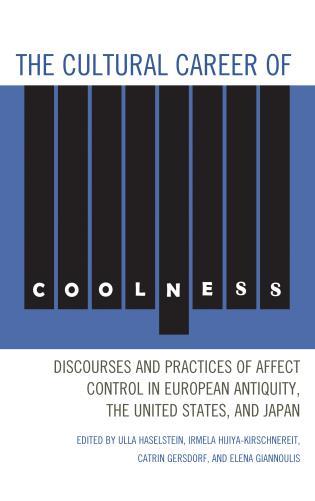Neuerscheinung: The Cultural Career of Coolness
News vom 24.01.2014
Bibliographische Angabe:
Ulla Haselstein; Irmela Hijiya-Kirschnereit; Catrin Gersdorf and Elena Giannoulis (Hrgs.): The Cultural Career of Coolness: Discourses and Practices of Affect Control in European Antiquity, the United States, and Japan, Lanham, Md. [u.a.], 2013.
Mit Beiträgen von: Joel Dinerstein; Sophia Frese; Jens Heise; Michael Kinski; Catherine Newmark; Jim McGuigan; Aviad E. Raz; Paul Roquet und Daniel Selden
Über das Buch:
Cool is a word of American English that has been integrated into the vocabulary of numerous languages around the globe. Today it is a term most often used in advertising trendy commodities, or, more generally, in promoting urban lifestyles in our postmodern age. But what is the history of the term “cool?" When has coolness come to be associated with certain modes of contemporary self-fashioning? On what grounds do certain nations claim a privilege to be recognized as “cool?" These are some of the questions that served as a starting-point for a comparative cultural inquiry which brought together specialists from American Studies and Japanese Studies, but also from Classics, Philosophy and Sociology. The conceptual grid of the volume can be described as follows:
(1) Coolness is a metaphorical term for affect-control. It is tied in with cultural discourses on the emotions and the norms of their public display, and with gendered cultural practices of subjectivity.
(2) In the course of the cultural transformations of modernity, the term acquired new importance as a concept referring to practices of individual, ethnic, and national difference.
(3) Depending on cultural context, coolness is defined in terms of aesthetic detachment and self-irony, of withdrawal, dissidence and even latent rebellion.
(4) Coolness often carries undertones of ambivalence. The situational adequacy of cool behavior becomes an issue for contending ethical and aesthetic discourses since an ethical ideal of self-control and a strategy of performing self-control are inextricably intertwined.
(5) In literature and film, coolness as a character trait is portrayed as a personal strength, as a lack of emotion, as an effect of trauma, as a mask for suffering or rage, as precious behavior, or as savvyness. This wide spectrum is significant: artistic productions offer valid insights into contradictions of cultural discourses on affect-control.
(6) American and Japanese cultural productions show that twentieth-century notions of coolness hybridize different cultural traditions of affect-control.
